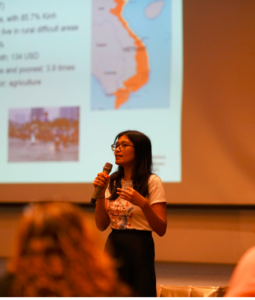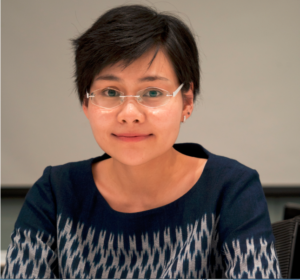
There are many remarkable Southeast Asian women who work in important areas in research institutions, governments, universities and pharmaceutical companies. This project aims to celebrate these amazing women and to inspire young women to take up careers in research and research-related fields.
This is the last of the blog series that coincides with International Women’s Day 2020. In total, this blog series featured 12 amazing Southeast Asian women in research.
Nguyen Thanh Ha
Nguyen Thanh Ha has a Master’s Degree in Global Mental Health and a Bachelor’s Degree in Environmental and Public Health. She is currently a University of Oxford Ph.D. (DPhil)student based at Oxford University Clinical Research Unit (OUCRU), Vietnam. Ha’s research is on vaccine perceptions and vaccine-related behaviors. She said, “the rate of vaccination has been quite high in Vietnam but in recent years we have witnessed serious outbreaks of vaccine-preventable diseases such as measles. We really need to understand why. What I found so far in the rural areas, is that they do not simply refuse vaccination or are “vaccine-hesitant”. It is more that there are challenges in getting the vaccination such as reaching vaccination centers because of harsh weather, distance, and poverty, which makes them prioritize work overtaking their children to get the vaccination.
Ha has been interested in health since she was in high school. She said, “I still can’t believe that I got accepted in Oxford. I was so lucky to get an internship with the public engagement team at the OUCRU, and this opportunity came about. I have a lot of support from senior colleagues at OUCRU and my family. I come from a family of academics – my mother is an Associate Professor in economics and my father has a Ph.D. in finance.” She jokes, “even though they have shown me an academic path, they still ask me when I will be getting married!”
When asked how to encourage young women to do research, Ha said, “there should be more equality in gender roles in society. In Vietnam, women are still told to get married in mid-20s and prioritize looking after the family. Men are often given more time to focus on their careers.
Ha is also active in community work. She is leading a community – based project to support young Vietnamese with mental health problems. She is the co-administrator of an online volunteer project with “Beautiful Mind Vietnam”.

Dr. Claire Chewapreecha
Dr. Claire Chewapreecha, who was born in Thailand, is the head of the Melioidosis Genomics Group at the Bangkok based Mahidol Oxford Tropical Medicine Research Unit. She has been awarded a series of studentships and grants to conduct cutting edge research on melioidosis, a deadly infectious disease affecting humans. This has included the prestigious Sir Henry Wellcome Postdoctoral Fellowship for early career researchers and more recently a Wellcome International Intermediate Fellowship and a Sanger International Fellowship. Claire said “I have received kind support from many mentors, and have been working with wonderful collaborators. I believe I’m a product of a great team effort and I am immensely grateful for that.”
When asked to talk about her work, Claire said, “I’m a geneticist by training. I’m interested in understanding the genetic basis of melioidosis infection. I was drawn to this work after a visit to a hospital in northeast Thailand, where the disease is prevalent especially among farmers. There, I witnessed first hand the impact melioidosis has on patients and their families. Almost half of people who contract melioidosis die. There is no vaccine available for its prevention”
When asked about challenges in research in her country, she answered, “for research in genetic and bioinformatics, the challenge still lies in the availability of human resources and the opportunities for their development. In Thailand, the number of new graduates in bioinformatics does not meet the demand. But the situation is improving, with more bioinformatics programs opening in Thailand recently. Also, there is more funding available to support further training overseas. So I really hope we will have more manpower to help solve problems, not only in melioidosis, but also for other public health issues.”.
She continued, “people in health research wear multiple hats at the same time, which can range from conducting research, teaching, administrative roles and caring for the family. I have my 94-year old grandad whom I attend to. It is important to find a balance.” In her spare time, Claire does acrylic painting.

Dr. Moul Vanna
Dr. Moul Vanna is the Executive Director of Action for Health Development (AHEAD) in Cambodia, where she is involved in managing multiple health-related projects such as the Cambodia Malaria Elimination Project
When asked what was her initial, personal draw to the field, she mentioned that she was motivated to serve people in the community to have good health with the focus on women’s health. “I wanted to see an improved standard of living including improved access to basic needs, adequate nutritional foods, quality health services, safe water, clean environment, methods to improve their present income-generating activity, expanded livelihood choices, and increased resilience to the impact of climate change and natural disasters.”
Dr. Vanna is pleased to see the increased awareness and positive changes in attitudes and behavior towards gender equality in Cambodia, which has resulted in a reduction of gender‐based violence in AHEAD’s target communities.
What does she think are challenges women researchers face in Cambodia? Dr. Vanna said “I think women are seen as more practical and less intellectual. I feel like when women ask difficult questions, they are less likely to get an answer.”
“In Cambodia, men continue to make the majority of the financial decisions for families. Domestic violence is deeply linked to social norms and gender differences in the household. We need to improve the development of skills for women and education for girls. We also need an enabling environment to allow women to have a good education and meaningful participation in society to increase their voices in decision‐making and to have leadership roles in government and community structures.”
Comments